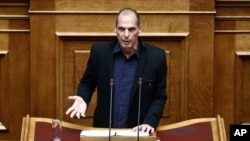Talks between Greece and its European creditors ended Wednesday without a compromise on the massive bailouts and corresponding austerity measures imposed on Athens.
The two sides failed even to agree on a joint statement following seven hours of emergency negotiations between Greek Finance Minister Yanis Varoufakis and eurozone finance ministers in Brussels.
Jeroen Dijsselbloem, the chairman of the eurozone finance ministers, said not enough progress was made to even agree on what to talk about when the two sides meet again on Monday.
"We didn't actually go into detailed proposals, we didn't enter into negotiations on content of the program or a program, we simply tried to work next steps over the next couple days. We were unable to do that," Dijsselbloem said.
Greece's new left-wing government, which was elected last month, is asking to renegotiate its $300 billion in loans rather than seek an extension when the latest segment expires at the end of February.
Greece wants its lenders — the other 18 countries in Europe's euro currency bloc, the European Central Bank and the International Monetary Fund — to give it a bridge loan for several months.
Athens said it needs the time to negotiate changes to the austerity plan forced on the country, under which wages and pensions have been cut, taxes boosted and thousands of civil servants laid off.
No signs of yielding
European officials have shown no indication of any willingness to ease the terms.
Dijsselbloem told his parliament: "An agreement is an agreement. That means that within the [bailout] program, measures could be exchanged for other measures."
New Greek Prime Minister Alexis Tsipras, who won a parliamentary vote of confidence Tuesday for his defiance of the country's creditors, said Athens would refuse to extend the bailout.
Varoufakis said the country's deeply troubled economy needs "to be able to breathe again to produce income" in order to repay its debts. He colorfully compared Greece's plight to that of a sick cow that can no longer produce milk.
"If you have a cow that is sick and doesn't produce enough milk, and you start whipping it, and you whip it more and more and more to produce more milk, at some point it will die," Varoufakis said.
"So, you won't get the milk you want. This is precisely what's been happening with the Greek economy over the last five years," he said.
"The troika has been whipping it, trying to extract as much surplus, if you want, out of it in order for us to repay our debts. But if you keep doing this, at some point, the economy simply dies. This Greek social economy no longer has the capacity to produce the income from which our debts can be repaid," Varoufakis said.





